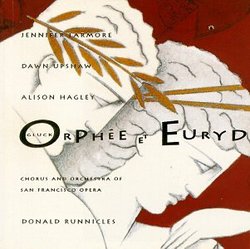| All Artists: Christoph Willibald Gluck, Jennifer Larmore, Dawn Upshaw, Alison Hagley, Donald Runnicles, Chorus and Orchestra of San Francisco Opera Title: Gluck: Orph�e et Eurydice (Berlioz version) / Larmore, Upshaw, Hagley, Runnicles Members Wishing: 0 Total Copies: 0 Label: Teldec Release Date: 6/4/1996 Genre: Classical Styles: Opera & Classical Vocal, Historical Periods, Classical (c.1770-1830) Number of Discs: 2 SwapaCD Credits: 2 UPC: 745099841829 |
Search - Christoph Willibald Gluck, Jennifer Larmore, Dawn Upshaw :: Gluck: Orph�e et Eurydice (Berlioz version) / Larmore, Upshaw, Hagley, Runnicles
 | Christoph Willibald Gluck, Jennifer Larmore, Dawn Upshaw Gluck: Orph�e et Eurydice (Berlioz version) / Larmore, Upshaw, Hagley, Runnicles Genre: Classical
|
Larger Image |
CD Details |
CD ReviewsOrpheus In Illusion Z. Yang | Hockessin, DE USA | 04/09/2003 (5 out of 5 stars) "Over the past 240 years, Gluck's Orpheus had experienced many variations. Original Orfeo ed Euridice in 1762 was in Italian and Orfeo was in the voice of an alto castrato. In 1774 during Gluck's five-year sojourn in Paris, much due to the Parisian's disapproval of castrati, he rewrote the opera and recast the protagonist as a French haute-contre - a particular kind of light and high tenor, along with expanding the opera into a full three acts, adding some numbers and a ballet. This Paris version and also the best version Orphe et Eurydice, which has provided the base for the other versions to follow, is brilliant in every aspect provided that a French haute-contre is available to tackle the higher-than-regular-tenor (about one third higher) music range of Orphe's, for which the chance has always been rare. Almost a century later, in 1859, Berlioz, a Gluck devotee, transposed Orphe of 1774 Paris version into mezzo-soprano's range. The revival has renewed the life of Gluck's Orphe et Eurydice by making it a great showpiece for mezzos and contralti, but at the same time, has totally deprived Orpheus of his masculinity. When Orphe is sung by mezzo or contralto, his/her lamentation at the loss of his/her lover Eurydice is more of an illusion than anything to be affecting, and as one can imagine, watching a mezzo Orphe on stage could get worse. Having said all these, this recording of Berlioz version is yet wonderful in terms of its artistic crafting and sound quality. Being the story of Orpheus and Eurydice, the opera is more of Orpheus' show with Orpheus getting the lion's share in singing. Jennifer Larmore has an amazing mezzo voice, sturdy and strong. "Amour, viens rendre mon me", with much more cadenza than one would expect from Gluck, has showcased her excellent vocal ability. Dawn Upshaw's light soprano is much needed for Eurydice in order to distinguish her in the duet with Orphe as well as in all-female trios. Her sweet voice delivers a most beautiful "Cet asile aimable et tranquille". L'Amour, who did more work in going-between the lovers than in singing, is but wonderfully sung by Alison Hagley. Chorus and Orchestra of San Francisco Opera, conducted by Donald Runnicles, are distinctive in bringing out the beauty and power and of the music." *En travesti* delight danielinyaracuy | San Felipe, Yaracuy Venezuela | 08/15/2001 (5 out of 5 stars) "I have to admit that I am quite surprised at how much I like this whole work. I only knew (woe to my ignorance) some highlights of this work (the famous flute solo, the despair aria of Orfeo in Italian and the dance of the Furies). And I did not know that Berlioz rearranged this opera to accomodate 3 female voices as the three, and only characters of the opera. This to the French version of Gluck himself, considered by some more complete and interesting than the Italian. This work is opera ambiguity at its best. Opera artificiality at its best. Thinking of the excellent Jennifer Larmore (Orpheus) longing for the charming Dawn Upshaw (Eurydice) is certainly an interesting experience. But I will not go into the diverse sexual and gender interpretations, and misinterpretations, that one can come up with. I will rather extoll the virtues of the recording, the greatness of the voices, the artistry of all, including even the cover art, the exhalting music, how all that ambiguity forces us to suspend belief and just enjoy, to let us be carried by emotion.... It is indeed a divine surprise to see how a 200+ year work can still sound so fresh and so present. A must!" Simply exquisite EriKa | Iceland | 09/29/2000 (5 out of 5 stars) "Jennifer Larmore and Dawn Upshaw, contemporary American opera divas, complement one another so well here... I get lost in the music and the melodic sounds of their voices. I love opera but am a complete novice and am slowly teaching myself about it. Many times you hear some piece of music and it is like an epiphany. I bought a CD of Jennifer Larmore doing different pieces from different operas as a general overview, and on the strength of her "J'ai perdu mon Eurydice" (from this opera) I bought this version of the entire opera, and it is most definitely a pleasure and culturally enriching to listen to it. This was like an epiphany for me, opening the doors to opera wide open!"
|

 Track Listings (29) - Disc #1
Track Listings (29) - Disc #1